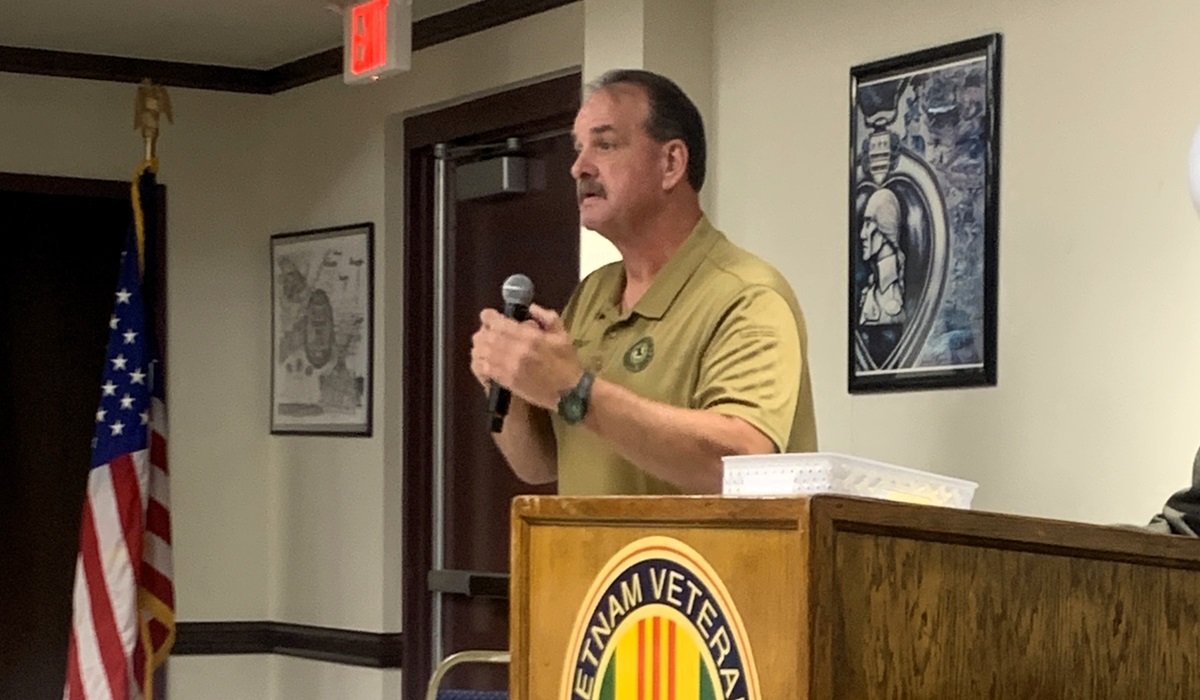

As Oklahoma’s Aug. 27 runoff election date approaches, incumbent Wagoner County Sheriff Chris Elliott is pushing back against accusations from challenger Tyler Cooper while making his own allegations that the Board of County Commissioners placed his wife on administrative leave as political retribution.
Cooper, a lieutenant for the Grand River Dam Authority Police Department, has dubbed the contest the “Sheriff showdown” and has criticized Elliott’s leadership by claiming deputy sheriffs are leaving the office after an average of only 11 months.
During a debate held Tuesday night at the Broken Arrow Veterans Center, Cooper argued that “people don’t leave a job, they leave leaders.”
“The issue is that they’re coming and going,” Cooper said. “The sheriff has done an excellent job of getting new guns, new body armor and new equipment.”
Elliott, who moved to Wagoner County in 1998 and became sheriff in 2016 after 27 years with the Tulsa Police Department, has called Cooper’s claims “misinformation and disinformation.”
In a July 24 Facebook post, Elliott responded to Cooper’s criticism of his leadership by citing an endorsement from the Wagoner County Fraternal Order of Police.
“Contrary to my opponent’s assessment of the Wagoner County Sheriff’s Office, low morale is not the issue here,” Elliot wrote. “The rank and file of this agency has officially stated that ‘we believe that your leadership has brought well-needed changes and improvements to the Wagoner County Sheriff’s Office.”
Elliot took office months after former Sheriff Bob Colbert resigned in April 2016. Colbert was indicted for felony bribery and extortion by Oklahoma’s multi-county grand jury. The charges were later dismissed and in 2017, but Colbert pleaded guilty to misdemeanor neglect of duty.
Elliot won reelection in 2020 by receiving more than 70 percent of the vote in the Republican primary, but he failed to garner majority support for a third term in June.
Cooper grew up in Ohio attending the private Xenia Christian School (now Legacy Christian Academy). After graduating in 2006, he enlisted in the Ohio Air National Guard. He met his wife while on deployment in Kyrgyzstan in 2010.
In 2014, Cooper moved to Wagoner County and started a ranching operation, E2C Cattle Co. Later that year, he became a Wagoner County Jail detention officer under Colbert, and by the end of the year he was promoted to deputy sheriff. In 2017, he left the sheriff’s office to work for the GRDA Police Department, where he was promoted to lieutenant in 2018.
Only Republicans filed for the sheriff’s race, so the winner of the Aug. 27 runoff will take office in January.
‘Clearly, you have to pay them to be there’

Tuesday’s Wagoner County sheriff debate — hosted in Tulsa County — included a pie auction fundraiser that netted $3,175 for the Broken Arrow Veterans Center. A four-part video recording of the event is available on the Broken Arrow Sentinel YouTube channel.
During the night’s discussion, both candidates said staffing is the biggest issue facing the sheriff’s office, but they disagreed on the cause. Elliott pointed to a “nationwide crisis” in recruiting officers, while Cooper argued the Wagoner County Sheriff’s Office specifically has an employee retention problem.
“The most critical need in this county right now is deputies and investigators and detention officers. And it’s a nationwide crisis,” Elliott said. “Biggest crisis we have in law enforcement all across the United States is attraction and retention. Clearly, you have to pay them to be there. Since I’ve been here in 2016, [the position of deputy sheriff] has been increased in pay over 26 percent and detention officers have increased by over 31 percent.”
Underscoring the concern, the Oklahoma Legislature created a new program to boost sheriff and deputy sheriff pay during the 2024 regular session, but Cooper alleged that Elliott’s tenure has exacerbated the situation in Wagoner County.
“The average deputy, we’ve already talked about, is only staying 11 months after they finish training,” he said. “That’s a problem. Our tax dollars go to train somebody else.”
While Elliott has received endorsements from Fraternal Order of Police lodges for Wagoner County, Rogers County and the Tulsa Police Department, Cooper has garnered his own local endorsements from former interim Wagoner County Sheriff Dan David and former Wagoner County Associate Judge Dennis Shook.
Elliott has also been endorsed by departing Rep. Kevin McDugle (R-Broken Arrow).
Elliott pans Cooper push for jail trust, says wife targeted by commissioners

During the debate, candidates disagreed on whether the Wagoner County Jail should continue to be managed by the sheriff’s office or be managed by a new jail trust. In March, Wagoner County voters rejected a proposal to create a jail trust and implement a 0.25 percent sales tax increase to fund the jail’s management. (Voters rejected the measure along with seven other county tax propositions.)
Cooper said he supports administering the jail through a trust to decrease the county’s legal liability as several other Oklahoma counties have done.
“The jail is the highest source of liability for any county, and it always will be,” Cooper said. “A jail trust is basically a third party comes in and manages your jail for you and there is an increased tax dollar associated with that, but it removes a lot of the liability from the county. Not all, but I would like to propose to the county and let them decide.”
Elliott, who spoke against the jail trust proposal, agreed that a jail can be the biggest source of liability for a county, but he touted his administration.
“Our jail just received a perfect jail inspection this year from the Oklahoma Department of Health, and that’s because our jail is probably one of the best operated in the state — if not the best operated jail in the state,” Elliott said. “In fact, the jail inspector told us, ‘I’ve never given out a perfect inspection.'”
In March, the Wagoner County Board of Commissioners placed 911 coordinator Judy Elliott — Chris Elliott’s wife — on administrative leave without publicly providing a reason. In April, the board hired attorney Samantha Marshall to investigate “personnel complaints” in the 911 department, and Judy Elliott remains on leave.
Asked about the situation at Tuesday’s debate, Elliott said his wife was Wagoner County’s 911 coordinator for 18 years and led the efforts to modernize the county’s 911 system during her tenure. Elliott indicated he believed his wife’s suspension came in retaliation for his stance opposing the county sales tax initiatives that failed in March.
“She’s been in there 18 years and (has) never been written up, never had a problem, never had an issue. Until I spoke out against the sales tax initiatives vocally and publicly,” Elliott said. “Eight days later — after those failed by 75 and 80 percent — she gets put on administrative leave.”
Elliott also claimed the Wagoner County commissioners spent at least $30,000 on legal fees investigating his wife.
“They sent her home and put her on administrative leave, and now they’ve spent over $30,000 hiring an attorney to investigate 911,” Elliott said. “So you read between the lines. She was not given her due process. I fully expect that she’s going to be terminated before the end of the month.”
Follow @NonDocMedia on:
Facebook | X | Text or Email
Audience asks about McGirt decision, state medical examiner
The first question from audience members Tuesday night asked each candidate if there is any policy proposed by their opponent that they would try to implement. Elliott answered first by saying no.
“I haven’t really heard him say anything that I would implement. Those things are already in practice at the sheriff’s office right now,” Elliott said. “He hasn’t brought anything to the table. All he’s doing is putting out misinformation and disinformation, such as not enough deputies out on the street and deputies speeding in their police cars.”
Cooper responded by pointing to policies he has advocated that he claims the sheriff’s office adopted “two months away from an election.”
“I started this campaign on three things. One was getting [school resource officers] in our schools. The next was getting supervisors on every shift in Wagoner County so we had experience and knowledge there. And the last was starting road crews — getting road crews back to Wagoner County,” Cooper said. “In the last month, we’ve done all three of those things. Those are things that should have been done in the last seven and a half years.”
Another question asked Elliott about why the Wagoner County Sheriff’s Office has continued using the Oklahoma State Medical Examiner’s Office to investigate deaths when that office has not been accredited since 2009.
Elliott argued the sheriff’s office was required by statute to use the medical examiner’s office when investigating a “fatality” and pushed back on the notion that the lack of accreditation mattered.
“As far as not being accredited, I have no idea what that means,” Elliott said. “Does it mean they don’t have enough bathrooms in there? Does it mean they don’t have the handicapped stuff? I don’t know, I’m not a doctor. I don’t accredit a medical examiner’s office. I have no idea what they’re talking about, but I know the medical examiners that I deal with down there.”
According to the National Association of Medical Examiners, accreditation of a state medical examiner’s office is done through peer review of offices, systems, policies and procedures. When the association accredits an office, an independent medical examiner has found the office as a whole meets “the minimum standards for an adequate medicolegal system.” Individual doctors are not accredited by the association.
Both candidates praised cross-deputization agreements when asked about the effects of the McGirt v. Oklahoma decision, which effectively held that only the Cherokee Nation, the Muscogee Nation or the United States has criminal jurisdiction over crimes committed by tribal citizens in Wagoner County.
“It’s all about working together,” Cooper said. “You’ve got to have an attitude that’s willing to work with others.”
Cooper also cited his positive experience being cross-deputized with the Cherokee Nation and Muscogee Nation while working at the GRDA, a state agency that canceled its cross-deputization cards issued to Cherokee marshals and Muscogee Lighthouse officers earlier this year following a brouhaha between law enforcement entities inside the Okmulgee County Jail.
Elliott said the post-McGirt situation in Wagoner County “is working and it works well,” and that his deputies are cross-deputized with the Cherokee Nation. While Wagoner County sheriff’s deputies are not cross-deputized with the Muscogee Nation, Elliott said he has a good relationship with the “Creek Lighthorse.”
“It makes no change on how we respond to calls. We go out and we investigate,” Elliot said. “The only difference is — and I’ve been doing it for years — is what court of jurisdiction do you send the case to? It’s not hard. Everybody’s trying to make a big deal out of it.”




















